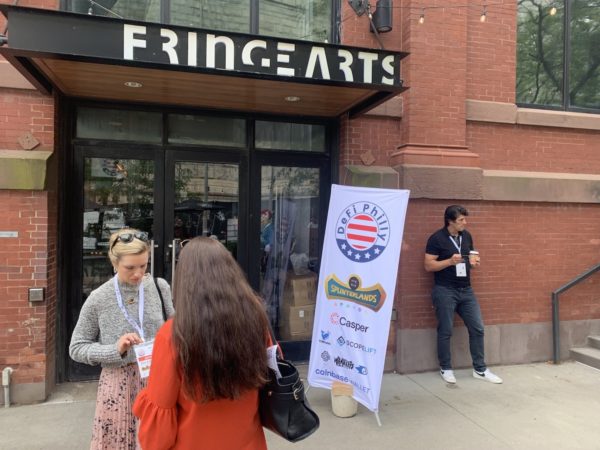They had their eyes on the week of Independence Day, Drew Mailen said, to highlight the freedom they feel decentralized finance and Web3 offers those who engage with it.
“We’re for going towards the way that allows people to own their own financial streams and own their own digital assets,” he told Technical.ly.
He, along with co-organizers Jake Voorhees, Eric Wittenberg, Michael Ghen and Michael A. Williams also chose an Old City location, Fringe Arts, to keep the theme going. On Friday, July 8, the group gathered about 250 attendees, speakers and sponsors at the waterfront venue for a daylong conference. Topics included blockchain-enabled companies and solutions, cryptocurrency, NFTs, fintech and the metaverse.
(Not sure what those mean? Here’s a glossary from Technical.ly’s Web3 Month.)

The group noted how other cities have found niches like NFT NYC, or Miami’s Bitcoin conference. They aim for Philadelphia to be a hub for decentralized finance and related topics.
“Whatever you’re into in Web3, our goal is, ‘How can we help you do what you’re trying to do?'” Vorhees said.
When I rolled up to the DeFi conference midday last Friday, the attendees were spilled out onto Fringe Arts’ patio for lunch, and about a hundred or so attendees and vendors were dispersed inside networking and eating.
I chatted with a few attendees, including one fintech startup founder, about the volatile few months the crypto market has had before we entered the venue’s main presentation space for a panel about the value of strong communities in the crypto space.
Community as business model
Dyshaun Hines, the local program director of Philadelphia Global Identity Partnership and founder of startup METRODAO, was joined on a panel by Karla Ballard, founder of Ying, a skill sharing community. They also spoke with Patrick Workman of Unlock, a community-owned and governed internet for participating in Web3.
Their companies and organizations achieve different goals, but they all lean on community buy-in and participation.
Ballard’s startup success depends on people sharing their skills with each other. She grew up in Germantown with “great social networks,” she said, but realized that’s not the case for everyone. After multiple career moves in the private and public sector, she began work on Ying in Philadelphia, amid the rise of other “sharing” economy companies like Uber and Task Rabbit. The platform lets users earn value by helping their colleagues and community members with tasks and then spend it for services requested — say, trading gardening skills for cooking. Time is the currency.
“Group skill sharing is empowering communities to unlock their capital,” Ballard said. “It’s understanding there’s two forms of currency. For us, it’s now empowering every group that wants to enter into a way to leverage the capacity of time and skills.”
Hines’ METRODAO uses transparent technology practices to incentivize civic engagement. It encourages users to get involved in the process of how money is spent in their communities, he said, and relies on community feedback to steer the way toward solving problems.
“We see blockchain as opportunity to verify, communicate, but create intentional, applicable feedback,” Hines said. “We’re looking to close that divide between community and decision makers.”
Will DeFi come to Big Tech?
With the rise of decentralized groups and forms of currency, an audience member asked if they thought the DAO structure could influence large tech companies in the future. DAOs are decentralized autonomous organizations, aka an org built with blockchain technology that forms with a specific end goal, most commonly for the members of that DAO to make big investments or purchases together. Workman, who’s worked at the likes of Google, Instagram and Pinterest, answered: likely not in a major way.
“As an employee at those companies, I was never asked my opinion about a proposal, I didn’t have a voting right, and I was on the inside,” he said. “The motivation of those companies is making a lot of money. I think companies will always be companies. There will always be a profit motivation. But I do think we’re going to see involvement with this idea of contributor-owned companies, with things like utilities.”
An example is the internet, he said. (Again: Hi, Web3.) But blockchain opens up more options for companies like Google to become more profitable. They’ll be able to get better at what they do with public data moving faster.
The question is one of advocacy, Hines said. He sees DAOs and DeFi as tools toward democracy; going to a fund holder — whether it’s a government or a corporation — and asking for participation in deciding how to use those funds, isn’t a new concept. But things may be changing.
“I do feel like this is an us moment where we have to become lobbyists and advocates and we have to ask for things to be implemented or else corporate structures will remain the same,” Hines said.
Organizers intend to make the DeFi Philly conference a yearly event, organizers say. Ghen, who runs the Crypto and Coffee meetup, will continue to run those events, and the org is considering a mid-year hackathon, likely in the winter.







